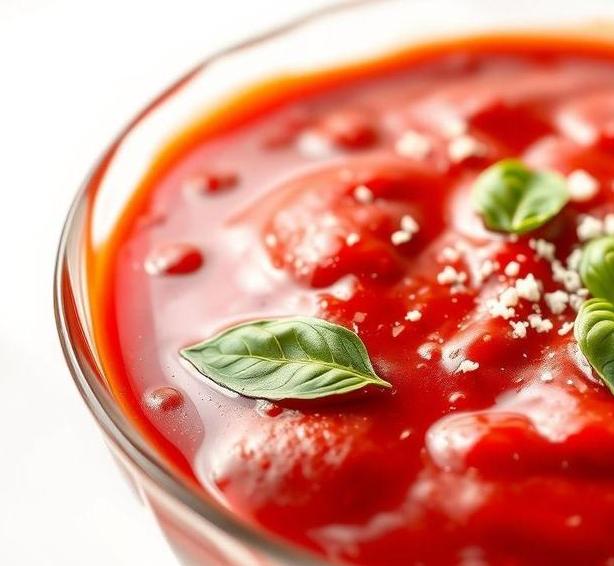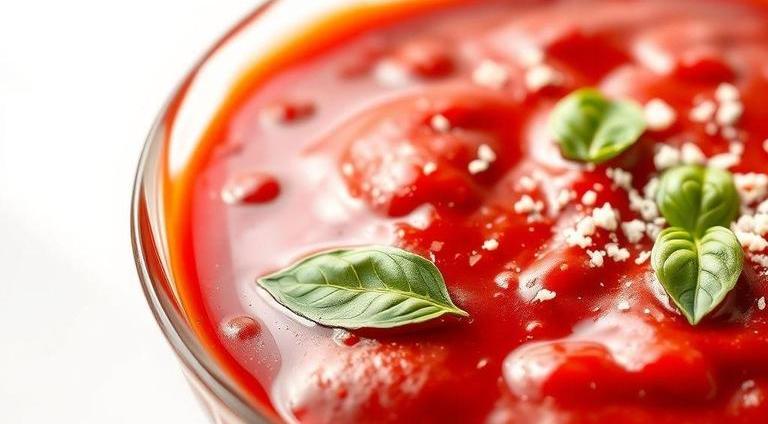Vodka sauce is one of those rich, creamy pasta sauces that has earned a spot in the hearts of many home cooks and restaurant-goers alike. Its creamy texture, coupled with the warmth of tomatoes and the subtle kick from the vodka, creates a sauce that’s perfect for elevating dishes like penne alla vodka. But what happens when you find a jar of vodka sauce tucked in the back of your pantry or fridge, and you’re unsure if it’s still safe to use?
Whether you’ve made it from scratch or bought it pre-made from the store, it’s essential to know how long vodka sauce lasts and how to tell if it’s gone bad. In this guide, we’ll go over everything you need to know-from how to spot signs of spoilage to expert tips for keeping your vodka sauce fresh for longer.
Can Vodka Sauce Go Bad?
Absolutely, vodka sauce can go bad. While it might have a shelf life that’s longer than some other sauces due to its alcohol content, the creamy components and tomato base make it prone to spoilage, especially if not stored properly. The combination of dairy (in the form of cream or milk) and tomatoes (which are acidic) creates an environment that can foster bacterial growth or cause the sauce to separate over time.
When we talk about vodka sauce going bad, we’re concerned about both food safety (whether it’s safe to eat) and its quality (how it tastes, looks, and behaves when heated). So, it’s not just about expiration dates-it’s about recognizing changes that might indicate spoilage.
Shelf Life For Vodka Sauce

The shelf life of vodka sauce varies based on whether it’s homemade or store-bought and how it’s stored. Here’s a breakdown:
Store-Bought Vodka Sauce
- Unopened jar: If you buy vodka sauce in a jar or bottle and it’s still sealed, it can last quite a long time-typically anywhere from 1 to 2 years. This is thanks to preservatives and a vacuum-sealed environment that prevents bacteria and mold from growing.
- Opened jar: Once opened, you should aim to use the sauce within 5 to 7 days if it’s kept in the fridge. The sauce will begin to lose its fresh flavor and creamy texture after this time.
Homemade Vodka Sauce
- In the fridge: Freshly made vodka sauce has a much shorter lifespan. It can last for about 3 to 5 days in the fridge, assuming it’s been properly stored in an airtight container.
- Frozen: If you made a large batch and want to store it for longer, freezing is a great option. Homemade vodka sauce can be frozen for up to 3 months without losing much flavor or texture. Just make sure you’re storing it in a well-sealed, freezer-safe container to avoid freezer burn.
Common Signs Of Spoilage
Knowing the signs of spoilage is key to determining whether vodka sauce is still safe to eat. Look out for the following:
Change In Color
- If the sauce has turned from a bright, rich red to a dull brownish or orangish hue, it could indicate that the sauce is losing its freshness. The change in color may be due to oxidation or bacterial growth, both of which can affect the quality.
Unpleasant Odor
- A sour or off-putting smell is one of the most common indicators that vodka sauce has gone bad. Fresh vodka sauce should have a savory, creamy aroma with a touch of alcohol. If it starts smelling rancid, it’s time to toss it.
Separation Or Curds
- While some separation is natural when storing sauces like vodka sauce, if you notice large curds forming or a gritty texture, it might mean the dairy component has spoiled. When the cream in the sauce breaks down, it can give a lumpy or grainy texture that’s unpleasant to eat.
Mold Growth
- This one’s pretty obvious-if you spot any fuzzy patches or unusual growth in the jar or container, the sauce is no longer safe to eat.
Off Taste
- If you taste the sauce and it’s either sour, too acidic, or has an odd aftertaste, don’t ignore this red flag. An off flavor is a clear sign that bacteria have started to break down the sauce.
How To Store Vodka Sauce?

Proper storage is key to extending the shelf life and maintaining the quality of your vodka sauce. Here are some helpful tips:
In The Refrigerator
- For store-bought vodka sauce: After opening the jar, seal it tightly and place it in the fridge. Make sure it’s kept at a steady, low temperature (ideally below 40°F or 4°C).
- For homemade vodka sauce: Allow it to cool completely before transferring it to an airtight container. Storing it in a shallow container will help it cool faster and prevent the growth of bacteria.
Freezing Vodka Sauce
- Vodka sauce freezes well if you store it properly. Use freezer-safe containers or resealable freezer bags for the best results. Make sure the sauce is cool before placing it in the freezer to avoid ice crystals forming inside. You can even portion it into smaller quantities for easy defrosting.
- Thawing: When ready to use, thaw the sauce overnight in the fridge. Reheat it gently on the stove, stirring occasionally to ensure the cream doesn’t separate.
Avoid Leaving It Out
- Always put vodka sauce back in the fridge as soon as you’re done using it. Leaving it out at room temperature for extended periods can accelerate spoilage, especially due to the dairy content.
Check For Air Exposure
- Minimize air exposure by using containers that seal tightly. Oxygen can cause the sauce to oxidize, affecting its taste and texture. If you’re storing leftover sauce, be sure the lid fits snugly to keep it as fresh as possible.
Expert Tips
-
Taste Test Before Using
- Before cooking or serving leftover vodka sauce, give it a quick taste to check if it still has that signature creamy, savory flavor. Even if it looks fine, a taste test can help you avoid using spoiled sauce.
-
Add Fresh Ingredients
- If your vodka sauce starts to lose its luster but isn’t quite spoiled, try adding a bit of fresh cream or more vodka to revive the flavor. A fresh batch of garlic or onions can also reintroduce some of the original zing.
-
Use Smaller Batches
- If you’re making vodka sauce at home, consider making smaller batches more frequently so you’re using it while it’s fresh. This can help you avoid the wastage of sauce that’s been sitting too long.
-
Avoid Reheating Multiple Times
- Reheating vodka sauce repeatedly can affect its texture and flavor, especially the creaminess. It’s best to reheat only the portion you plan to use.
-
Label And Date
- If you’re storing vodka sauce in the fridge or freezer, write the date it was made or opened on the container. This simple step helps you keep track of how long it’s been stored, making it easier to determine if it’s still good to use.
FAQs
Can Vodka Sauce Go Bad If Left Out Overnight?
Yes, vodka sauce can go bad if left out overnight. Like most sauces with dairy and tomatoes, it should not be left at room temperature for more than two hours, as bacteria can grow and spoil the sauce.
How Long Can Vodka Sauce Last In The Fridge?
Vodka sauce can last 3 to 5 days in the refrigerator when stored in an airtight container. Be sure to check for any changes in texture, color, or odor before consuming.
Can You Freeze Vodka Sauce To Extend Its Shelf Life?
Yes, you can freeze vodka sauce. It will maintain its quality for up to 3 months in the freezer. Be sure to store it in a freezer-safe container or bag, and allow it to cool completely before freezing.
What Signs Indicate That Vodka Sauce Has Gone Bad?
Signs that vodka sauce has gone bad include sour or off smells, discoloration (such as a darker or dull appearance), and separation of ingredients. Mold growth is also a clear sign of spoilage.
Can Vodka Sauce Spoil Even If It Has Not Been Opened?
Yes, even unopened vodka sauce can spoil if it is past its expiration date or has been stored improperly. Always check the expiration date on the packaging and store it in a cool, dry place.
How Can You Tell If Homemade Vodka Sauce Has Gone Bad?
Homemade vodka sauce should be stored in the refrigerator and used within 3 to 5 days. To tell if it’s gone bad, look for signs like an unpleasant odor, mold, or separation of ingredients. If in doubt, it’s better to discard it.
What Is The Best Way To Store Vodka Sauce To Prevent It From Going Bad?
The best way to store vodka sauce is in an airtight container in the refrigerator. If freezing, use a freezer-safe container or bag, leaving some room for expansion as the sauce freezes.
Can Vodka Sauce Go Bad If It Has Alcohol In It?
While alcohol acts as a preservative, vodka sauce can still go bad because of the dairy and tomatoes it contains. Alcohol does not prevent spoilage, especially after the sauce has been opened or improperly stored.
How Long Does Vodka Sauce Last After Opening?
Once opened, vodka sauce typically lasts 5 to 7 days in the refrigerator. Always check for any signs of spoilage, such as changes in color, texture, or smell, before consuming.
Can Vodka Sauce Go Bad If It Has Been Reheated Multiple Times?
Yes, reheating vodka sauce multiple times can lead to bacterial growth and spoilage. It’s best to reheat only the amount you plan to use, and avoid reheating the sauce more than once.